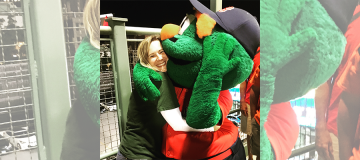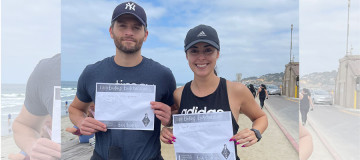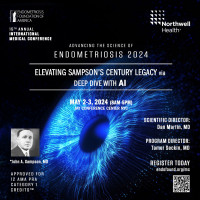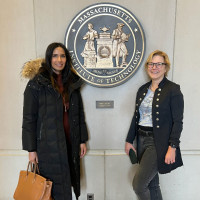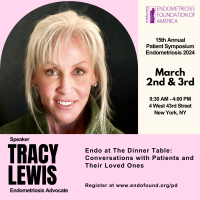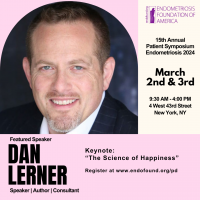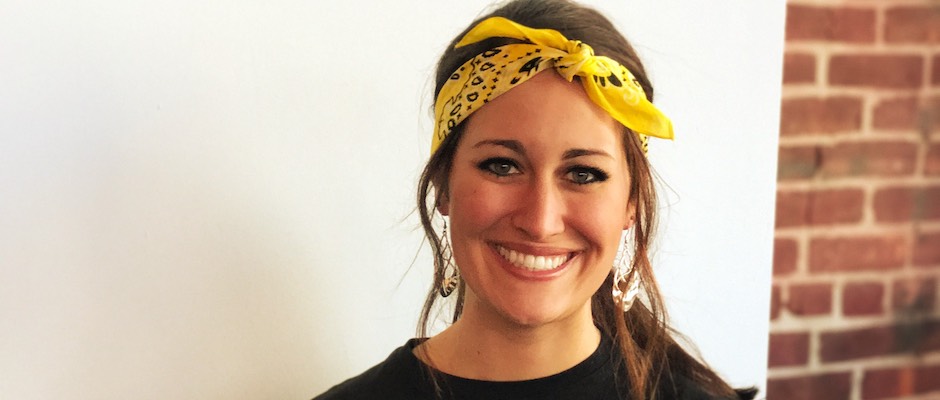
Hi everyone, I’m Melissa.
I got my first period when I was 11 years old, accompanied by severe pelvic pain that left me clenching every muscle in my body. My Mom always told me that she had the same horrific cramps during her cycle, so like many other poorly educated young girls, I thought painful periods were “normal.” I was a motivated, type-A, “had to get a 4.0” student throughout my entire education, so I pushed through and never missed a day of school for my period—though I probably should have. Fatigue, pain, and heavy bleeding, leaving my clothes and sheets blood stained in the mornings, were all too familiar every single month.
When I was a junior in nursing school (2011), I clearly remember sitting for one of my final exams on diabetes. It was a couple of days before my period, and a wave of nausea and sharp epigastric pain came over me. I was seen for this in the clinic, but the nurse practitioner diagnosed it as “bad period symptoms” and prescribed 800 mg of ibuprofen every four hours. [Side note—all my life, ibuprofen was the ONLY thing that would help alleviate my menstrual cramping, so I popped 800 mg of those babies every four hours as it was. That’s beyond the recommended daily dose]. She was no help to me.
The symptoms continued. I was nauseated, but could still be hungry at the same time. This was very unusual. And the sharp, stabbing, knife-like pains between my rib cage continued. Sometimes the pain would worsen after eating, no matter what it was that I ate. After going back to the doctor, they recommended I see a general surgeon for a potential gall bladder issue. A series of abdominal and pelvic ultrasounds, blood work, and a HIDA scan were all precursors to my visit with the first doctor who ever mentioned the word endometriosis. I shared that my symptoms were always circulating around the time of my period, so he put a call into an OB/GYN colleague and within a week I was in the OB office. I was started on birth control and within four months I switched out between four different birth controls and my first injection of Depo-Lupron. Despite the many negative comments I’d heard about Lupron, for me it actually worked very well for 6 months.
In June 2013, I had my first laparoscopic surgery to explore for endo. At the same time, I had my gall bladder removed by the general surgeon who suspected endo; a joint surgery. There was no definitive diagnosis of endo, though the OB surgeon stated he cauterized what he thought “might have” looked like a lesion on my uterus. I recovered just fine, but the first month I got my period after my surgery was worse than ever! Even more so, the epigastric pain was back and horrendous! Guess it wasn’t the gallbladder!
In January 2014, I was seen by a new internal medicine doctor who reviewed my symptoms and referred me to a GI specialist. I had an EGD and was found to have severe erosive gastritis, likely from the overabundance of ibuprofen I had been taking for my severe periods. My stomach was also full of bile. Nothing like a strong acid sloshing around on an irritated stomach lining! I was prescribed Dexilant, which after the first month my insurance would not cover and was $600 for a 30-day supply. I stopped that and the epigastric pain returned with a vengeance. It seemed like no one could or would help me, so I lived with this pain and debilitating flare-ups for the next three years.
In July 2017, I switched hospitals and saw a new GI specialist. I had another EGD and colonoscopy, where it was found I now had “chronic” bile gastritis. She believed the gall bladder surgery caused a complication where the normal flow of bile into the small intestine was back-flowing into my stomach, causing more erosion and pain. She talked about the possibility of having to complete a roux-en-y gastric bypass surgery if the pain did not improve with a new medication, Questran. I took this until my husband and I started trying to conceive in 2018. Thankfully at this point I was working as a nurse on a unit with regular gastric bypass surgeries and knew the implications and possible complications. I absolutely refused!
About a month after my husband and I started to try to conceive (June 2018), I developed the most severe pain I’ve ever had in my life. I was working a day shift and my husband was actually sitting for his nursing boards. I had to call my Dad to come pick me up from work (something I had NEVER done!). The crushing pain felt like nothing I had ever experienced. I went home to rest with my heating pad and ended up going in for an appointment with yet another new OB doctor the next week. We now figure it was likely an ovarian cyst rupturing. During a pelvic exam, the doctor said he felt a nodule on the back of my cervix and ordered a pelvic ultrasound. He called me the next day with the results, which showed endometriomas on both of my ovaries. I was on the schedule for laparoscopic surgery the next week.
When I woke from surgery and was taking my first walk down the hallway, the nurse assisting me said, “You’re the patient with stage 4 endometriosis, right?” No one had told me the news yet. I nearly vomited. As I gently crawled back into my hospital bed, clutching a pillow against my freshly cut-open abdomen, I leaned my head back into the pillow and felt an overwhelming rush of fear. “Mom?” I asked, “She said I have endometriosis. Is that true?” My sweet Mama with tears welling up in her eyes on my left, and my husband tightly squeezing my hand on my right: “Yes, honey. They found endometriosis. The most severe stage.” I began to cry so hard my incisions were crying with me. Here are the thoughts that went through my mind:
-
I’m never going to be able to have kids
-
Now I’m at higher risk of getting ovarian or uterine cancer
-
I’m going to be in pain the rest of my life
-
Why didn’t any of those other doctors find this?
-
Why wasn’t this diagnosed on my first surgery (2013)?
-
How is this going to affect my husband?
Real thoughts and emotions flooded me. I could predict that almost every woman who’s been diagnosed with endo has had at least one of these thoughts at some point. Fear. Uncertainty. Frustration. Endometriomas were found on both of my ovaries (one the size of a golf ball), there were chocolate lesions all over my pelvic cavity, blood staining on my colon, bladder, and appendix, my cul-de-sac (space between the uterus and rectum) was full of endo tissue, as well as scarring and adhesions. The very first period after this surgery was still to this day, the most painful period I have ever had. What’s worse: the doctor who performed my surgery said that was to be expected! Is this just the way it has to be now?!
As my mind and heart were not satisfied, I began doing all the research I could on endometriosis. I bought and read Dr. Seckin’s book, The Doctor Will See You Now, and that was the first time I ever heard about deep-excision surgery. I was led to the MN Endo Warriors online and learned about the Worldwide EndoMarch. I attended the Minnesota March and was introduced to a panel of experts who were trained in deep-excision endo surgery. I advocated for myself and submitted all of my past medical and surgical records to The Mayo Clinic in Rochester, MN. I was accepted as a patient by Dr. Zaraq Khan, who performed deep excision surgery on me in August 2019. In one year’s time, I was diagnosed with stage 4 (again): endometriomas were found on both ovaries again, both of my ovaries and fallopian tubes were adhered to my pelvic side walls, and dense scar tissue and adhesions had grown over my pelvic cavity like spider webs. There was again tissue invading my cul-de-sac, which had been causing painful bowel movements and painful intercourse (also my tipped/backward uterus could be contributing to this as well).
Let me rewind and say that from June 2018 to August 2019 I was still unable to get pregnant, though the doctor who did my ablation surgery stated that I should “have no problem” conceiving now. Dr. Khan was the first doctor who I ever met who validated my pain the moment I walked into his office. He told me my pain was real and that he would do everything in his power to help me. I felt heard, cared for, and reassured for the first time in my life. I had the surgery and was scheduled for my first fertility treatment in September, intrauterine insemination (IUI). He believed that because of my advanced case of endo and unexplained infertility, we should jump right into treatments even though the surgery itself should help with my fertility (that was the hope and goal).
At the end of my first IUI, I tested positive for pregnancy! Unfortunately the day after I tested positive, I tested negative. My doctor believes it could have been a chemical pregnancy (very early miscarriage). The next month, October, was our 5th wedding anniversary. We had already made plans to fly to Las Vegas and drive down to climb and hike Angel’s Landing in Zion National Park, Utah. We decided we would pause on October’s cycle and start the next IUI in November. To our surprise, on November 1st I tested positive for pregnancy and it was confirmed with a positive HCG blood test! We got pregnant NATURALLY! Sadly, we miscarried at 6 ½ weeks, but we are still thankful for the miracle we did have!
In December, we decided to hold on IUI as it had been extremely emotional losing a baby and with the stress of the holidays, we believed it was best to just take a break that month. However, we had a similar experience with testing positive, and then the next day negative during this cycle: another possible chemical pregnancy.
In January, we did our second IUI. Failed. We got back into contact with Dr. Khan and he gave us two options: 1) Go through another 1-2 cycles of IUI and wait for the outcomes; 2) Make an appointment to go back to Rochester and begin the process of IVF. We chose the latter. We were scheduled for a pre-IVF consult on March 27th, but due to the coronavirus pandemic we have been asked to call back in May for updates about openings. However, March 27th was still a great day because I learned that my great aunt and possibly maternal grandmother had endometriosis (which would explain my Mom’s symptoms, as well as mine if there is a genetic link!).
This March we again tested positive for two days in a row and then negative: a possible third chemical pregnancy. Though my excision surgery was successful in getting us officially pregnant once, I have still had more symptoms of endo. Periods have not been as painful, but during my IUI ultrasounds, a new endometrioma was already found on my left ovary. I’ve experienced rectal pain, painful urination, severe bloating, fatigue, nausea, and still require medicine and heating pads during periods.
I joined as a volunteer Endo Educator through the Endometriosis Foundation of America and taught the ENPOWR lesson at two of our local high schools. I want to be a voice for this disease and all the women it has and will affect. I am also a participant of the ROSE study through EndoFound. It took me nine doctors to finally find the one who could help me, and fifteen years to receive a correct diagnosis. I urge anyone reading my story to keep fighting for answers until you have a diagnosis! Endometriosis is the leading cause of infertility and my heart goes out to any woman who is enduring both endometriosis and infertility. This is not just a physical disease, but also emotional, spiritual, mental, and financial. I am only one person, but if I am able to tell my story and help one other person, then my efforts have succeeded.
Melissa Tucker was diagnosed with stage 4 endometriosis at age 26. She is a certified medical surgical registered nurse and has a passion for holistic healing. She loves Jesus, lives in the country, enjoys taking on new outdoor adventures with her husband, and advocating for women’s health. She has finally found her voice and purpose in educating the world about endometriosis, sharing her story, and helping women find hope in the midst of hurt.
Editor's note: Would you like to contribute to EndoStories? Click here to learn how to submit your work.
*Patient stories submitted to EndoFound.org are the views of the patient and not necessarily those of the foundation. All testimonials are from real patients, and may not reflect the typical patient’s experience, and are not intended to represent or guarantee that anyone will achieve the same or similar results.



